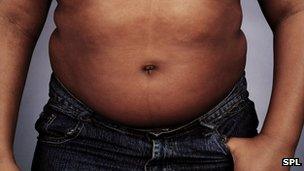British Asians set lower BMI target
- Published

Carrying too much weight around your waist increases the risk of conditions like type 2 diabetes
Health advisers have set a new, lower obesity measure threshold for British Asians.
The National Institute for Health and Care Excellence guidance says this and other ethnic groups must be extra careful about their weight because they are prone to diseases like diabetes.
The stricter target brings the UK in line with Indian and World Health Organization recommendations.
It means a 5ft 11in (1.8m) Asian man should weigh below 11st 11lb (75kg).
And an Asian woman who is 5ft 3in (1.6m) should weigh less than 9st 4lb (59kg).
Body Mass Index
The guidelines say a healthy weight should be gauged according to a person's Body Mass Index.
BMI is a way of seeing if your weight is appropriate for your height.
It is calculated, external by taking your weight (in kilograms) and dividing it by your height (in metres) squared to give you a BMI score.
Until now, experts have said all UK adults should aim for a BMI of no more than 25 to be healthy.
But NICE says that doesn't go far enough for certain ethnic groups.
Its new guidelines say Asian people should aim for a BMI lower than 23.
People from black and other minority groups would most likely also benefit from having a BMI less than 23, but should aim for a BMI at least lower than 25.
Excess body fat contributes to more than half of cases of type-2 diabetes and a fifth of heart disease cases as well as certain types of cancer.
The number of people affected by these health conditions is far greater among black, Asian and other minority ethnic groups - despite rates of obesity among these groups being similar to the white population.
Diabetes UK said it was good to move away from a "one size fits all" approach to BMI.
Dr Rachel Pryke of the Royal College of GPs said: "These are helpful guidelines that bring home the importance of tailoring guidelines to individuals, for example, we know that some ethnic groups are susceptible to different health risks."